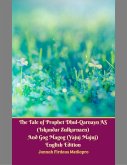The Story of Prophet Jesus (Pbuh) and Prophet Muhammad SAW In Islam Faith Based from The Noble Quran & Al-Hadist.In many verses of the Glorious Qur'an Allah SWT (God) the Exalted denied the claim of the Christians that He has a son. A delegation from Nagran came to the Prophet Muhammad SAW. They began to talk about their claim about the Trinity, which is that Allah is three in one, the Father, the Son, and the Holy Spirit, with some disagreement among their sects. That is why Allah affirmed in many verses of the Qur'an that Prophet Jesus or Prophet Isa (Pbuh)is a slave of Allah SWT (God), whom He molded in the womb of his mother like any other of His creatures, and that He created him without a father, as He created Prophet Adam (Pbuh) without a father or a mother.Allah the Almighty said: Allah chose Adam, Noah, the family of Abraham and the family of Imran above the Alamin (mankind and jinns) (of their times). Offspring, one of theo other, and Allah is All-Hearer, All-Knower.Remember when the wife of Imran said: "e;O my Lord! I have vowed to You what (the child that) is in my womb to be dedicated for Your services (free from all worldly work; to serve Your Place of worship), so accept this, from me. Verily, You are the All-Hearer, the All Knowing."e;Then when she delivered her (child Mary), she said: "e;O my Lord! I have delivered a female child,"e; and Allah knew better what she delivered, - "e;and the male is not like the female, and I have named her Mary, and I seek refuge with You (Allah) for her and for her offspring from Satan, the outcast."e;So her Lord (Allah) accepted her with goodly acceptance. He made her grow in a good manner and put her under the care of Zechariah. Every time he entered Al-Mihrab (a praying place or a private room), he found her supplied with sustenance.He said: "e;O Mary! From where have you got this?"e;She said: "e;From Allah. Verily, Allah provides sustenance to whom He wills, without limit."e; (Ch 3:33-37 Quran)Allah SWT (God) declared that He had elected Prophet Adam (pbuh) and the elite of his offspring who obey Allah. Then He specified the family of Prophet Abraham (pbuh), which includes the sons of Prophet Ishmael (pbuh), and the family of Imran, the father of Mary (Maryam). Prophet Muhammad SAW was born in Mecca (Makkah), Arabia, on Monday, 12 Rabi' Al-Awal (2 August A.D. 570). His mother, Aminah Bint Wahb, was the daughter of Wahb Ibn Abdu Manaf of the Zahrah family. His father, 'Abdullah, was the son of Abdul Muttalib. His genealogy has been traced to the noble house of Ishmael, the son of Prophet Abraham in about the fortieth descend. Muhammad's father died before his birth.Before he was six years old his mother died, and the doubly orphaned Muhammad was put under the charge of his grandfather Abdul Muttalib who took the most tender care of him. But the old chief died two years afterwards. On his deathbed he confided to his son Abu Talib the charge of the little orphan.When Prophet Muhammad SAW was twelve years old, he accompanied his uncle Abu Talib on a mercantile journey to Syria, and they proceeded as far as Busra. The journey lasted for some months. It was at Busra that the Christian monk Bahira met Muhammad. He is related to have said to Abu Talib: 'Return with this boy and guard him against the hatred of the Jews, for a great career awaits your nephew."e;After this journey, the youth of Muhammad seems to have been passed uneventfully, but all authorities agree in ascribing to him such correctness of manners and purity of morals as were rare among the people of Mecca. The fair character and the honorable bearing of the unobtrusive youth won the approbation of the citizens of Mecca, and by common consent he received the title of "e;Al Ameen,"e; or The Faithful.
Dieser Download kann aus rechtlichen Gründen nur mit Rechnungsadresse in A, B, BG, CY, CZ, D, DK, EW, E, FIN, F, GR, HR, H, IRL, I, LT, L, LR, M, NL, PL, P, R, S, SLO, SK ausgeliefert werden.









